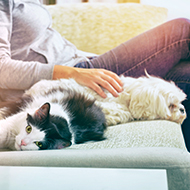BVA kickstarts National Pet Month with social media campaign

National Pet Month aims to raise awareness of and celebrate responsible pet ownership.
Veterinary professionals are being urged to share stories and photos of the pets that inspired them to embark on a career with animals as part of the 2022 National Pet Month campaign.
The call from the British Veterinary Association (BVA) comes after a survey revealed that, perhaps unsurprisingly, 81 per cent of vets own at least one pet.
Of the 825 vets who responded to the BVA's Spring Voice of the Veterinary Profession survey, 68 per cent said that some or all of their pets came from rehoming abandoned stray animals.
Topping the list of the most popular pets for vets are dogs - with almost a quarter owning more than one dog. The results also show that around half of vets own a cat while one in eight owns a horse.
During National Pet Month (1 April – 2 May), veterinary professionals are being asked to share photos and stories about their pets on social media using the hashtags #VetsAndTheirPets, #VNsAndTheirPets or #NationalPetMonth2022.
BVA president Justine Shotton, who has been a dog-lover since childhood, explained that her love for canines grew when her parents adopted two Japanese Spitz called Tora and Hana.
Justine said: “I had a very strong bond with my childhood dogs, especially with Tora. We would take them to dog shows for fun, and Tora even made it to Crufts! I would build agility courses for the garden out of garden furniture, and we would race from the end of the garden to the house – Tora would always win!"
BVA junior vice president Malcolm Morley attributes his life-long love for animals to him and his brother being allowed to have guinea pigs as children.
He said: “Having the guinea pigs growing up certainly triggered my interest in being a vet. We had to learn to care for them, find out about their food and welfare needs and also how to look after their babies when they came along. I loved having them so much that when my own children said they would like pets, it was an easy decision to welcome more guinea pigs into our family."
National Pet Month aims to celebrate and raise awareness of responsible pet ownership through educational campaigns and resources across its various platforms. The campaign is spearheaded by the National office For Animal Health (NOAH) and the Pet Food Manufacturers Association (PFMA).



 The RCVS has announced a new version of its 1CPD mobile app, with enhanced features for veterinary surgeons and veterinary nurses to record their continuing professional development.
The RCVS has announced a new version of its 1CPD mobile app, with enhanced features for veterinary surgeons and veterinary nurses to record their continuing professional development.